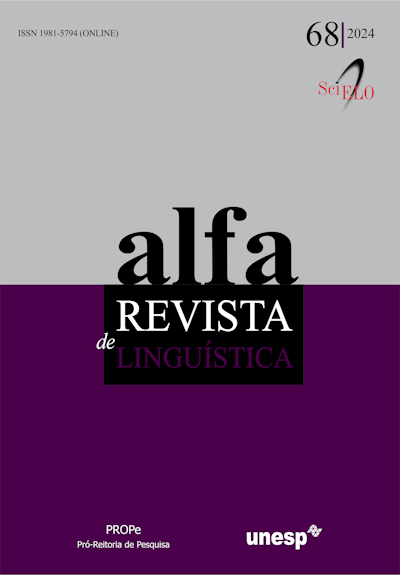Sobre as relações entre nota e sílaba na palavra cantada
DOI:
https://doi.org/10.1590/1981-5794-e14845Palavras-chave:
reestruturação silábica, processos fonológicos, melodia, palavra cantada, prosódiaResumo
A palavra cantada apresenta frequentemente construções anômalas do ponto de vista prosódico. Tudo indica que tais construções não podem ser descritas exclusivamente pelo ambiente linguístico em que ocorrem. A excepcionalidade dessas construções se manifesta na realização de processos fonológicos em ambientes nos quais tais processos seriam bloqueados e, reciprocamente, em seu bloqueio em ambientes nos quais seria esperada a sua realização. O objetivo do presente trabalho é descrever esse comportamento divergente da palavra cantada com relação à palavra falada. Inicialmente apresentaremos exemplos que ilustram a dimensão e a generalidade do problema. Em seguida argumentaremos que a excepcionalidade constatada pode ser explicada se assumirmos a hipótese de que a relação entre texto e melodia na palavra cantada é determinada por condições de boa formação. Uma dessas condições, que denominamos Pareamento Métrico, estabelece que a relação entre nota e sílaba é sempre bijetiva, ou seja (I) toda e qualquer nota de uma melodia deve ser pareada a uma e apenas uma única sílaba, e (II) toda e qualquer sílaba de uma cadeia deve ser pareada a uma e apenas uma única nota. A observância dessa condição de boa formação explica tanto a realização quanto o bloqueio de processos fonológicos em divergência com a fonologia do português falado.
Downloads
Downloads
Publicado
Como Citar
Edição
Seção
Licença
Copyright (c) 2024 ALFA: Revista de Linguística

Este trabalho está licenciado sob uma licença Creative Commons Attribution 4.0 International License.
Os manuscritos aceitos e publicados são de propriedade da Alfa: Revista de Linguística. É vedada a submissão integral ou parcial do manuscrito a qualquer outro periódico. A responsabilidade do conteúdo dos artigos é exclusiva dos autores. É vedada a tradução para outro idioma sem a autorização escrita do Editor ouvida a Comissão Editorial.

